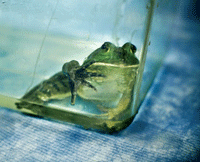
<a href="http://www.shutterstock.com/cat.mhtml?lang=en&language=en&ref_site=photo&search_source=search_form&version=llv1&anyorall=all&safesearch=1&use_local_boost=1&searchterm=pesticides&show_color_wheel=1&orient=&commercial_ok=&media_type=images&search_cat=&searchtermx=&photographer_name=&people_gender=&people_age=&people_ethnicity=&people_number=&color=&page=1&inline=169450757" target="_blank">PiggingFoto</a>/Shutterstock
This piece was originally published by Civil Eats.
There’s an important debate going on in Europe that could dramatically influence how pesticides are used on the United States’ 400 million acres of farmland. At the center of the debate are endocrine disruptors, a broad class of chemicals known for their ability to interfere with naturally occurring hormones.
Endocrine disruptors have been linked to a range of health disorders [PDF] that include obesity [PDF], diabetes, behavior, and learning problems [PDF], and to reproductive disorders, including infertility. These chemicals are found in many plastics and countless consumer products, including cosmetics, and building materials. They include bisphenol-A (BPA), certain phthalates, and numerous flame retardants. The active ingredient in some of the pesticides most widely used across the American farm landscape, such as atrazine, 2,4-D, and organophosphates, are also widely believed to fall in this category.
In 2011, due to growing concern, the European Union decided to restrict the use of pesticides that act as endocrine disruptors. But that legislation cannot be fully implemented until members of the European Commission can agree on an official definition of “endocrine disrupting chemicals.” That decision is now overdue.
Once in place, these would be the first such regulations anywhere in the world. And given the global market for pesticides—and agricultural products—what happens in Europe will have important implications in the US and beyond.
Case in point: The endocrine disruptor argument is being watched closely by those taking part in—and watch-dogging—the closed-door trans-Atlantic trade talks now going on. As part of those discussions, the US government and pesticide industry groups are reportedly urging for a “harmonization” of US and E.U. policies. But critics, including the Center for International Environmental Law, note that US and E.U. trade groups are pushing to ensure that E.U. environmental standards begin conforming to US regulations. And when it comes to pesticides, many US standards are less stringent than those in Europe.
At the heart of the current E.U. debate is whether to designate chemicals as endocrine disruptors based on either a) science that shows their potential to act as endocrine disruptors or b) science that also includes a risk assessment with data about exposure and documented adverse effects—a scenario that can be challenging in the realm of endocrine disruptors whose effects may take years to become apparent.
If defined as the former—essentially using the E.U.’s precautionary approach—a great many more chemicals could potentially be swept into this category and possibly restricted. The latter would make it considerably more difficult to restrict a chemical’s use. In recent comments submitted to the European Commission, the US Department of Agriculture (USDA)’s Foreign Agriculture Service argues strongly for the latter approach, one that would also include an economic cost-benefit analysis, saying that, “imposing unnecessary restrictions” on pesticides “could have far-reaching and particularly detrimental consequences.”
The US government’s position largely echoes the positions taken by chemical industry groups, including CropLife America and the American Chemistry Council—groups that have a great deal riding on the outcome of this decision. Based on estimates compiled by companies that manufacture pesticides and other agricultural chemicals, the US government says that restricting pesticides as endocrine disruptors based on the broader definition would jeopardize as much as $69 billion worth of imports to Europe, including over $4 billion worth coming from the US Pesticides themselves are also big business, with sales worth billions every year.
More than 90 percent of the corn, soy, wheat, and potatoes grown in the US—many of our prime export crops—are treated with pesticides. Virtually no conventionally grown crops are untouched, but tomatoes, apples, grapes, rice, oranges, and peanuts top the USDA’s list for the amount used on the farm level.
Pesticides used most on these crops include glyphosate (the active ingredient in “Roundup”), atrazine, chlorpyrifos, 2,4-D, and two less well-known pesticides called metolachlor and acetochlor. All of these have been identified in various scientific studies as having adverse effects on the endocrine system.
At the same time, exposure to endocrine disruptors appear to be costing Europeans an enormous amount of money. According to several studies published earlier this month, the estimated annual healthcare costs associated with exposure to endocrine disrupting chemicals in pesticides was $126 billion.
This is the estimated annual cost of several neurological disorders linked to these chemical exposures, including lowered IQ and behavioral disorders such as attention deficit hyperactivity disorder. The studies’ authors say this is likely an under-estimation and suggest that exposure and costs in the US are comparable or greater.
In information posted to its website, CropLife America says that “to date” the US EPA Endocrine Disruptor Screening Program “has demonstrated that crop protection products do not impact the estrogen axis in people or wildlife.”
But Andrea Gore, University of Texas at Austin professor of pharmacology and toxicology whose research focuses on endocrine disruptors, says “there is ample evidence that many kinds of pesticides are endocrine disrupting chemicals” and that “many pesticides are known to act through estrogen systems.”
Gore also says she feels “strongly” that the EPA’s endocrine disruptor screening test methods are out-of-date and “do not include state-of-the-art approaches to identifying estrogenic chemicals,” a view shared by other scientists working in this field. These test methods, she adds, don’t address “the most relevant issues to endocrine disruption, such as critical development periods of life when even very low-dose exposures can have permanent and often adverse effects later in life.”
The European Commission is now reviewing the more than 27,000 comments received on its proposed definition of endocrine disruptors. Meanwhile, it remains to be seen whether US policy-makers will consider the recent healthcare cost estimates for endocrine-disrupting pesticide exposures as they move forward with these deliberations.
Sweden, Denmark, and the European Council of Ministers have filed a lawsuit against the European Commission over its failure to define endocrine disruptors by its own December 2013 deadline. The E.C. expects to complete this decision-making process in 2016.
Commenting on these policy debates, Paul Towers, spokesperson for Pesticide Action Network, worried that the US position could “lower the bar” and lessen health protections everywhere.



















